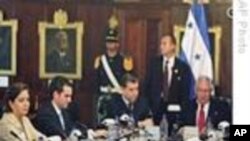<!-- IMAGE -->A delegation of foreign ministers from Latin America, the Caribbean and Canada organized by the Organization of American States ended a mission to Honduras without a hoped-for breakthrough on ending the standoff over restoring democratic order in that country.
Although progress reportedly was made in discussions with the de facto government headed by the former leader of the Congress, Roberto Micheletti, Honduran leaders said they aren’t ready to sign an agreement to end the crisis and allow President Manuel Zelaya to return from his forced exile.
The United States supports the restoration of democratic and constitutional order in Honduras. It has worked hard to find a peaceful resolution to the crisis and will continue to do so. As a consequence of the de facto regime’s reluctance to sign the agreement, known as the San Jose Accord, the U.S. government finds it necessary to conduct a full review of our visa policy in Honduras.
As part of that review, we are stopping the processing of non-emergency, non-immigrant visa applications in the consular section in our embassy in Honduras, effective August 26, a move intended to signal the severity of the continued stalemate in Honduras.
The decision will mostly affect tourist visas, of which the U.S. grants an average of about 30,000 a year. Immigrant and emergency travel visas will continue to be issued by the U.S. Embassy, though.
In light of the de facto regime’s position on the San Jose Accord, the U.S. is reviewing other elements in its policy toward Honduras as well. While officials there say they support most of the accord’s provisions, they have refused to allow President Zelaya to return to office and they say they have concerns about enacting legislation granting amnesty for any alleged political wrong-doing during the crisis.
The U.S. firmly believes these steps are needed as part of a negotiated settlement, however, and that they will allow Hondurans to focus on the future rather than remain mired in the political crisis.
Although progress reportedly was made in discussions with the de facto government headed by the former leader of the Congress, Roberto Micheletti, Honduran leaders said they aren’t ready to sign an agreement to end the crisis and allow President Manuel Zelaya to return from his forced exile.
The United States supports the restoration of democratic and constitutional order in Honduras. It has worked hard to find a peaceful resolution to the crisis and will continue to do so. As a consequence of the de facto regime’s reluctance to sign the agreement, known as the San Jose Accord, the U.S. government finds it necessary to conduct a full review of our visa policy in Honduras.
As part of that review, we are stopping the processing of non-emergency, non-immigrant visa applications in the consular section in our embassy in Honduras, effective August 26, a move intended to signal the severity of the continued stalemate in Honduras.
The decision will mostly affect tourist visas, of which the U.S. grants an average of about 30,000 a year. Immigrant and emergency travel visas will continue to be issued by the U.S. Embassy, though.
In light of the de facto regime’s position on the San Jose Accord, the U.S. is reviewing other elements in its policy toward Honduras as well. While officials there say they support most of the accord’s provisions, they have refused to allow President Zelaya to return to office and they say they have concerns about enacting legislation granting amnesty for any alleged political wrong-doing during the crisis.
The U.S. firmly believes these steps are needed as part of a negotiated settlement, however, and that they will allow Hondurans to focus on the future rather than remain mired in the political crisis.




